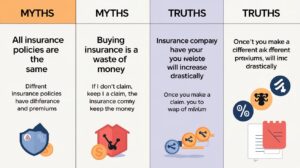Insurance for Beginners: Everything You Need to Know About Getting Started
Table of Contents
- Introduction to Insurance
- Why is Insurance Important?
- Types of Insurance
- How to Choose the Right Insurance Policy
- Understanding Common Insurance Terms
- How to Apply for Insurance
- Filing an Insurance Claim
- Frequently Asked Questions
- Conclusion
1. Introduction to Insurance
This is probably one of the most important ways to ensure that when there is sudden, critical financial pressure on a person, he will not be left destitute. Life is a surprise day by day; it brings some in a positive way, but others cost a challenge to meet. Whether it’s an unwelcome illness or car accident or destruction of your house, all this surely will have straining effects on your pocket. It covers the money in case of such trying moments so that one doesn’t face those complicated situations worrying about sudden bills.

In some ways, the world of insurance can be pretty frightening. Policies, premiums, deductibles. There are just so many things one has to learn about them. However, armed with this information, choosing an insurance policy is that much easier. This is an insurance primer that demystifies the very basics for readers in simple terms that should not confuse or frighten you.
From life and health to car and home, all forms are designed to secure one aspect of your life or the other. In essence, knowing what exists and how they work will always serve you in being responsible over your financial safety and security. It will take you through the basic facts, whether you are an insurer for the first time or have experience with insurance but want more enlightenment on the matter.
By the end of this chapter, you will understand insurance terms, how to apply for insurance, and the steps in filing a claim if needed. Insurance does not have to be intimidating to get started; knowing the right things puts you at ease in the protection of what matters most.
2. Why is Insurance Important?
Insurance is important because it protects you financially. Here are some key reasons:
- Financial Security: Insurance helps you avoid big financial losses.
- Emergency Coverage: Insurance covers unexpected events, so you’re not alone during a crisis.
- Peace of Mind: Knowing that insurance will help in tough times can reduce stress.
- Legal Requirement: Some types of insurance, like car insurance, are required by law in many countries.
3. Types of Insurance
There are many types of insurance. Each type covers a different aspect of life or a specific need.

A. Life Insurance
Life insurance pays money to your family or beneficiaries if you pass away. There are two main types of life insurance:
- Term Life Insurance: Covers you for a specific period, like 10, 20, or 30 years.
- Whole Life Insurance: Covers you for your entire life and has an investment component.
B. Health Insurance
Health insurance helps pay for medical expenses, including doctor visits, hospital stays, and prescription medicines. Health insurance is essential because medical costs can be very high.
C. Auto Insurance
Auto insurance protects you if you are involved in a car accident. It can cover damages to your vehicle, medical bills, and even damages to other people’s property.
D. Home Insurance
Home insurance protects your home and belongings from damages caused by events like fires, storms, or theft. This insurance can also cover accidents that happen in your home.
E. Disability Insurance
Disability insurance provides income if you are unable to work due to an illness or injury. There are two main types:
- Short-Term Disability Insurance: Covers a short period, usually up to 6 months.
- Long-Term Disability Insurance: Covers you for years or until you can work again.
F. Travel Insurance
Travel insurance covers unexpected problems that might happen while traveling, such as trip cancellations, lost luggage, or medical emergencies abroad.
4. How to Choose the Right Insurance Policy
Choosing the right insurance policy can be challenging, but these steps can help:

- Assess Your Needs: Think about what do you need the most protection about. Do you want coverage for your family in the event that something happens to you? Or perhaps insurance for health-related bills you might incur.
- Research and Compare Options: Research several other insurance companies and their policies as well. Compare the quotes, coverage, and advantages.
- Check the Premium: The premium is the cash you pay for your cover. Ensure it suits the budget.
- Read the fine print: Read carefully what is contained in the policy so you would know what is covered and what is not.
- Get professional advice: If there is any doubt, just consult with an insurance adviser who could help understand which options to take.
5. Understanding Common Insurance Terms
Insurance policies include terms that can be confusing. Here are some of the most common terms:
- Premium: The amount you pay regularly to keep your insurance active.
- Deductible: The amount you must pay before the insurance company starts to pay for your claims.
- Beneficiary: The person who receives the payout from a life insurance policy if you pass away.
- Policyholder: The person who owns the insurance policy.
- Coverage Limit: The maximum amount an insurance company will pay for a covered loss.
- Exclusion: Things that are not covered by your insurance policy.
6. How to Apply for Insurance
Applying for insurance is generally straightforward. Here are the steps:
- Choose the Type of Insurance: Decide what kind of insurance you need (life, health, auto, etc.).
- Get Quotes: Contact different insurance companies for quotes. Many websites provide online quotes.
- Fill Out an Application: Once you choose a policy, fill out an application with the insurance company. You will need to provide personal and financial information.
- Underwriting Process: The insurance company will review your application, which may include a health check (for life or health insurance).
- Accept and Start Paying the Premium: If approved, you can start paying your premium to keep the policy active.
7. Filing an Insurance Claim
If you experience an event covered by your insurance, you can file a claim. Here’s how to do it:

- Report the Incident: Contact your insurance company as soon as possible to report the event (accident, loss, damage).
- Fill Out a Claim Form: The insurance company will give you a form to complete, describing what happened.
- Provide Documentation: You may need to provide evidence, such as photos, receipts, or medical reports, to support your claim.
- Claim Processing: The insurance company will review your claim and may send an adjuster to inspect the damage.
- Receive Your Payout: Once the claim is approved, you will receive a payout based on the policy terms.
8. Frequently Asked Questions
Q: What is the best type of insurance to get first?
A: It depends on your situation. For many, health insurance is a priority, while others may consider life or auto insurance essential.
Q: How much insurance do I need?
A: The amount of insurance you need depends on your lifestyle, family situation, and budget. An insurance advisor can help you determine the right coverage.
Q: Can I have more than one insurance policy?
A: Yes, many people have multiple policies, such as life, health, and auto insurance.
Q: Is my insurance premium fixed?
A: It depends on the type of policy. Some premiums stay the same, while others can change based on age or health.
9. Conclusion
In reality, insurance is the core part of financial planning. It guards you against unpredictable expenses and enables you to be in control of risks at any point in life. Knowing the basics, for example, types of insurance and how to apply for them, can make insurance buying easy and give one peace of mind. From life insurance to health or auto insurance, always look out for research and choose what best suits your needs and budget.




